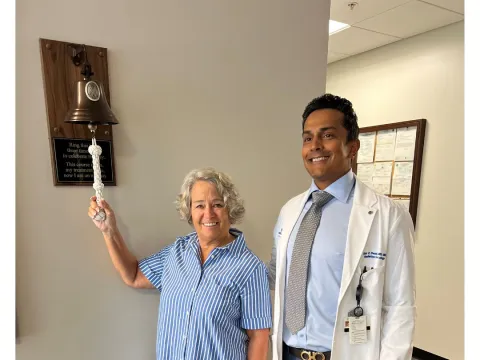- AdventHealth
As the town of Parker and surrounding communities keep growing, AdventHealth Parker’s emergency department is getting busier. Every year, the ED has experienced an increase in patients, and an increase in the seriousness of patients’ illnesses and injuries.
To help manage the growth, the ED recently implemented rapid assessment zones in October 2024 to improve throughput and decrease the number of people who left without being seen.
“Reimagining the triage process with front line nursing input was vital to the success of this project,” said James Sandoval, MSN, RN, CEN, Director of Emergency Services. “We also engaged with multidisciplinary committees such as the ED patient experience council, radiology services committee, ED providers, and front-line staff members.”
Following those meetings, the ED decided to switch from a traditional triage process to a rapid assessment zone (RAZ). Once patients are triaged into the emergency department, they go to an intake room where they are seen by the RAZ nurse and provider. IVs, labs, and medications are given as needed, and then the patient is moved to a treatment lounge.
From there, imaging and other departments can come and retrieve patients for additional testing and return them to the lounge area. The RAZ RN stays in close communication with the triage RN and charge RN, and together they work to move patients who need additional monitoring to a room once one becomes available.
“Patient experience was top of mind when designing this process,” said James. “By talking with nurses and providers from other hospitals who had implemented rapid assessment zones, we learned how vital it was to have a clear understanding of the process for patients.”
That’s why the ED worked with marketing and supply chain to create a video for patients that is played on iPads in the intake room. An education program was also developed to train all ED nurses and critical care technicians in the new process.
“This initiative gets the patients in front of a provider quickly, so we have the right orders at the right time, expediting our process,” said James.
Since the rapid assessment zone was implemented in October 2024, the amount of time the ED has had to go on divert has dropped from 29 hours on average per month to only nine hours. The amount of time between a patient’s admission and disposition decreased by an average of 12 minutes. The amount of time from when a patient was admitted to when they saw a provider decreased by an average of six minutes. Since October 2024, the average percentage of patients who left without being seen is down to 0.53%, well below the department’s goal of less than 1%.
“I am encouraged by the great success we have already seen by implementing the rapid assessment zone. It has helped us stay open for our community,” said James.
Recent News

AdventHealth debuts first-of-its-kind Performer Health Program in Central Florida
AdventHealth is launching the Performer Health Program, a first-of-its-kind initiative in Central Florida focused on addressing the unique health needs of artists and performers.

AdventHealth named among U.S. News & World Report’s fifth annual 2026 Best Hospitals for Maternity Care
This marks the third year in a row AdventHealth Shawnee Mission has appeared on the U.S. News & World Report’s list of Best Hospitals for Maternity Care.

AdventHealth Waterman strengthens access to expert specialty care with expansion of Mount Dora medical plaza
Second floor buildout adds orthopedics, sports medicine, women’s health and heart care for Lake County

Expanding hope through innovation: AdventHealth advances cancer care across East Florida
Cancer touches nearly every family, and in Flagler, Lake and Volusia counties, the demand for timely, advanced care keeps rising. AdventHealth’s East Florida Division, which includes seven hospitals...

For two Hope Clinic patients, music spurs recovery
STROKESTRA heals stroke survivors in so many meaningful ways.

A new chapter begins: AdventHealth Avista opens its on-campus surgery center
This milestone marks a meaningful new chapter for a team whose history stretches back more than two decades.

AdventHealth Porter Performs Rare, Complex Robotic Kidney Cancer Surgery
AdventHealth Porter has reached an extraordinary milestone in surgical innovation, completing what is believed to be the first robotic left radical nephrectomy with inferior vena cava (IVC)...

Amanda Robinson, DO, joins AdventHealth Medical Group Family Medicine, Internal Medicine & Pediatrics at Curtis Parkway
AdventHealth is pleased to announce that Amanda Robinson, DO, has joined AdventHealth Medical Group Family Medicine, Internal Medicine & Pediatrics at Curtis Parkway.

Helping the Helpers: Spotlight on AdventHealth Avista’s Director of Supply Chain, Mike Vos
For Mike Vos, Director of Supply Chain at AdventHealth Avista, caring for others isn’t just part of the job - it’s woven into his family story. With a mother who is a career nurse and now Director of...

New hospital brings world-class, whole-person care to Minneola
AdventHealth Minneola will bring nationally recognized care close to home in South Lake County.

New surgeon expands local access to advanced colorectal care in Volusia County
Dr. Mark Heimberger joins AdventHealth as part of its continued investment in bringing minimally invasive and robotic colorectal treatment options to the region’s growing community.

AdventHealth Lake Placid launches Low Dose Lung Screening CT program to help detect cancer early
AdventHealth Lake Placid has launched a new Low Dose Lung Screening CT program, bringing this life-saving service closer to home for people who live in and around Lake Placid.
